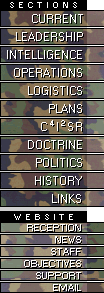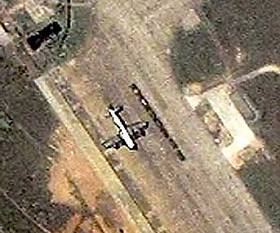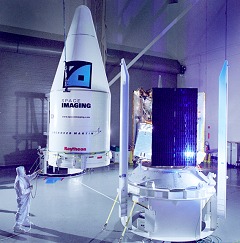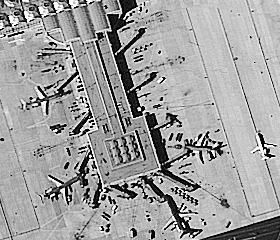





Intelligence in the Information Age:
Spy Data For Sale
April 18, 2001

he satellite photograph of a U.S. Navy electronic surveillance aircraft on the ground in China, published widely in the media last Thursday, shows how much the world has changed with regard to the amount and kinds of information openly available to anyone on security matters. Not long ago, such a photograph was accessible only to a few intelligence services. Now it can be purchased online.
This kind of information from commercial satellite companies, combined with the increasing volume of data passed via cell phones, the Internet and other electronic sources, is making an unprecedented amount of security information much more easily collectible and available for any interested observer.
By all accounts, the role of information in both statecraft and warfare is growing. Information technologies are creating greater "transparency" in political and military affairs. The word in this sense refers to the fact that are fewer and fewer secrets: Information about the characteristics of a government or military entity - or the location and condition of a downed plane, for example - is available to any foreign government, non-governmental organization or individual. And the rapid availability of the data increases the pressures on decision makers, who need to identify which information is relevant in any given situation and respond faster than ever to a public and other governments that have access to virtually the same material.
While we can observe this transparency, we have yet to come to grips with its effects, both within the United States and the world community. The Bush administration must cope with the reality that its diplomatic, military and intelligence activities will be widely visible to friend and foe alike, placing an increased premium on public diplomacy in international affairs and timing, maneuver and stealth in military operations.

One suggested benefit of having so much available information is the creation of an "open-skies effect," giving many countries early warning on potential problems so they can take action. Another argument, on the other hand, is that nefarious actors at any level, from individual terrorist to head of state, might wreak havoc more easily by virtue of their increased knowledge about facilities and operations around the world. And, because the United States plays such an important role in the development and marketing of information technologies, many governments fear that transparency will be a threat to their norms and cultures and a tool of U.S. influence.
For the United States, the transition to a more transparent world should be less fraught than for others. Having chosen to be transparent against the more closed Soviet adversary during the Cold War, the United States should be able to adapt more quickly to this openness than our current adversaries. But it still will not be easy.
Because the technology has become so widely available and entrenched, it makes sense not to fight transparency at its source - by trying to limit the spread of technologies and the information they provide - but rather to fundamentally adapt the way we conduct diplomatic, military and intelligence activities.
By no means is transparency an unambiguous good. As the early days of commercial satellite imagery have demonstrated, transparency holds a diversity of challenges, including the following: inexpert or poor-quality interpretation, especially in technical areas; superficial or biased analysis performed by people who lack experience or have a political agenda, and denial and deception, as governments or individuals attempt to use this data to confuse, rather than clarify security developments and policy debates.
The challenge for intelligence is different than during the Cold War. There are many more potential adversaries, and the targets are increasingly informed and witting of traditional intelligence methods. Where it is possible to have them, secrets are more important than ever for maintaining a security edge in the world.
This opens the door to the need for radically new types of intelligence gathering and analysis. Rather than try to compete with the new technologies and the information they provide, intelligence services can specialize in providing data and analysis that is unavailable by any other means. Among the many ways to do this are to reinvigorate the use of intelligence agents, increase long-term analysis, fuse together complex intelligence data and pursue the state-of-the-art in remote sensing, whether from aircraft, space or elsewhere. While various studies have identified weaknesses in these areas, there needs to be more strategic vision about how to fix them.

Rather than revisit the stale debate about whether the country should be investing more in satellites or spies, we would be wise to recognize the value of a diverse, creative and continuously updated strategy of collecting and analyzing security information, using a combination of people and technology.
In the face of the power of technology to gather raw data very rapidly, the intelligence agencies would do best to focus on exploiting open sources of information, collecting specialized data and on the broader view that good analysis can bring to bear. Rather than perpetuate a recent debate about whether intelligence focuses too heavily on short-term military threats at the expense of longer-term strategic problems, the Bush administration needs to concentrate on the basic structural problems of U.S intelligence. Among these are the need to increase funding for intelligenceand emphasize analysis over collection.
Intelligence agencies need to spend fewer resources exploiting conditions in foreign countries and end the current tendency to chase breaking news in an attempt to be responsive to policy-makers. While some of this is necessary, too much leaves the intelligence community unable to support important, long-term missions such as strengthening homeland defense and curbing nuclear arms proliferation and terrorism. Whatever the merits of the programs, the new administration's embrace of missile defense and space control will require enormous investments in intelligence information-gathering and analysis.
The photograph of the Navy EP-3 on the ground in China is an example of the increasingly easy availability of data. This development does not diminish the importance of intelligence, but it does change its role. Intelligence must shift rapidly from being just another information provider to one that collects unique information and analyzes what is really going on. The paradox of the EP-3 case is that, just as the plane's location is available for all the world to see, its mission - the gathering of and analysis of information - remains as important a role for intelligence as ever.
Text source: Kevin M. O'Connell, RAND Corporation, April 8, 2001
© 2001 CheckPoint |














